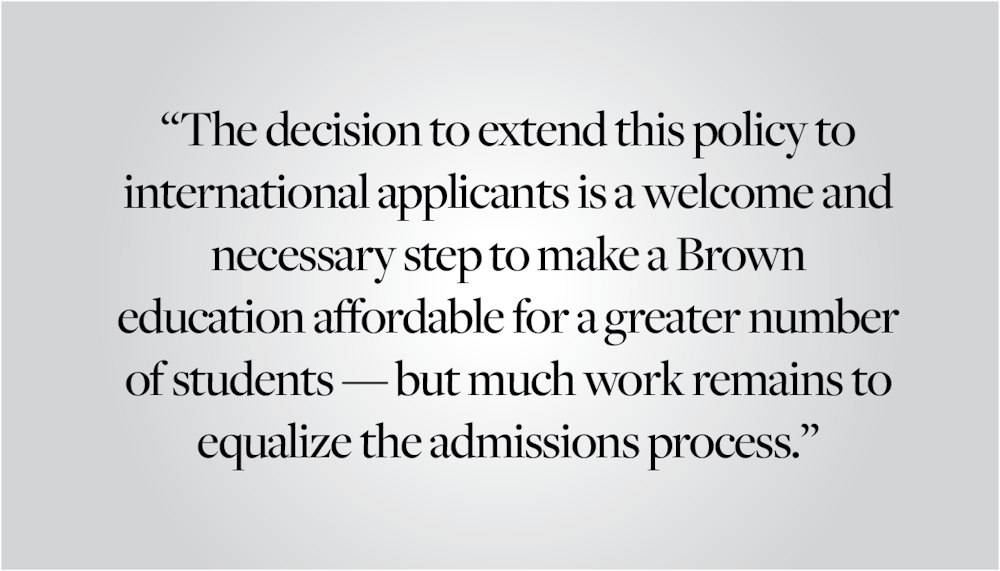The University announced Jan. 25 that it will shift to a need-blind admissions process for international students, beginning with the class of 2029. The decision comes just over 20 years after Brown adopted a need-blind policy for domestic applicants in 2003, which barred financial background or ability to pay tuition from affecting chances of admission. The decision to extend this policy to international applicants is a welcome and necessary step to make a Brown education affordable for a greater number of students — but much work remains to equalize the admissions process.
The expansion of need-blind policy comes amid a wider reckoning with class privilege in higher education. Studies show that wealthy students are admitted to elite private universities at significantly higher rates than similarly qualified low and middle-income applicants. This is especially true for Brown, which ranks 230th out of the 286 most selective colleges in America, according to a New York Times analysis. This lack of diversity is especially apparent in the international student population. For current international students on aid, this can contribute to a harmful assumption that international students are a homogeneously wealthy group. The new policy of need-blind admissions will hopefully begin to reverse this stereotype.
As more schools adopt a need-blind approach to domestic admissions, international students are consistently excluded. Universities often rely on the assurance of full-tuition payments from a certain number of international students to generate their revenue. The fact that Brown is only the eighth college to extend need-blind admissions to international applicants shows the breadth of this financial challenge. The fundraising and administrative efforts that made need-blind international admissions (and other initiatives like the Brown Promise) possible are admirable and show a sustained commitment to dissolving economic barriers for all students.
That being said, access to financial aid does not remedy all of the inequities in college admissions. The ability of more-resourced students to pay for application assistance — such as essay editors or SAT tutors — as well as the advantages inherent in attending better-funded high schools or having connections to university alums all mean that simply getting financial aid does not level the playing field entirely. This is especially true for international students. Schools outside of the United States tend not to be oriented toward the American application system. In order to get crucial aid for this relatively complicated and specific process, international students either have to pay for external help or already have connections to people who understand the system. When you include the disparities caused by steep exchange rates, this external aid — often priced in dollars — becomes even more expensive for students from countries with weaker currencies.
Whether international or domestic, the University must offer more support for potential applicants. There are already multiple resources available to support current international students, including the student-run international mentorship program and a series of new initiatives led by the international advising team. Providing support and resources tailored to low-income international applicants, whether through free-to-access aid online or direct outreach programs, could prove transformative. The University should also consider changing the application process itself so that it is more fair for students who can’t access external aid for the process, such as devaluing the importance of SAT scores over international school grades.
We commend Brown for committing to such an important step toward a more equitable admissions process — knowing that it is the first down a much longer path.
Editorials are written by The Herald’s editorial page board and aim to contribute informed opinions to campus debates while remaining mindful of the group’s past stances. The editorial page board and its views are separate from The Herald’s newsroom and the 134rd Editorial Board, which leads the paper. This editorial was written by the editorial page board’s members Paul Hudes ’27, Paulie Malherbe ’26, Laura Romig ’25, Alissa Simon ’25, and Yael Wellisch ’26.





